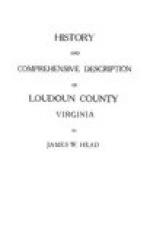With muscles of iron and hearts of oak, they united a tenderness for the weak and a capability for self-sacrifice worthy of an ideal knight of chivalry; and their indomitable will, which recognized no obstacle as insuperable, was equalled only by their rugged integrity which regarded dishonesty as an offense as contemptible as cowardice. For many years they dwelt beyond the pale of governmental restraint, nor did they need the presence of either courts or constables. Crimes against person, property, or public order were of so infrequent occurrence as to be practically unheard of. In moral endowments—even if not in mental attainments—these sturdy pioneers of Loudoun were, it must be admitted, vastly superior to many of those who followed them when better facilities for transportation rendered the County more accessible.
Society before and for many years after the Revolution was easy, agreeable, and somewhat refined. Traveling was slow, difficult, and expensive. For society, the inhabitants were mainly dependent upon themselves; the ties of social life were closely drawn. Books, newspapers, and magazines were rare; men and women read less, but talked more, and wrote longer and more elaborate letters than now. “Cheap postage has spoiled letter writing.” Much time was spent in social visits; tea parties, and supper parties were common. The gentlemen had their clubs and exclusive social gatherings, sometimes too convivial in their character, and occasionally a youth of promise fell a victim to the temptations of a mistaken hospitality. “Gaming was more common among respectable people than at the present day.”
CUSTOMS.
Of leisure, all classes at all times had a superabundance, and it was cheerfully devoted to mutual assistance without thought of recompense, except in kind. If anyone fell behind through sickness or other misfortune, his neighbors would cheerfully proffer their services, often making of the occasion a frolic and mingling labor with amusement.
On days set apart for the pulling of flax and wheat-cutting, the neighbors and their children assembled in happy mood and as cheerfully applied themselves to their gratuitous tasks. While the men were pulling the flax or reaping and shocking the wheat, the women at the house were preparing the harvest-noon feast. The rough table, for which the side and bottom boards of a wagon were frequently used, was placed when practicable under the shade of a spreading tree in the yard. The visitors contributed from their meagre store such additional dishes, knives, forks, and spoons as were needed. Around the table, seated on benches, stools, or splint-bottom chairs, with such appetites as could only be gained from honest toil in the open field, the company partook of the bounties set before them. These consisted, in addition to the never-failing corn-bread and bacon, of bear and deer meat, turkey, or other game in season, and an abundance of vegetables which they called “roughness.” The bread, styled “jonny-cake,” was baked on journey or “jonny” boards, about two feet long and eight inches wide. The dough was spread over the boards which were then placed before the fire; after one side was browned, the cake was reversed and the unbaked side turned toward the flames.




